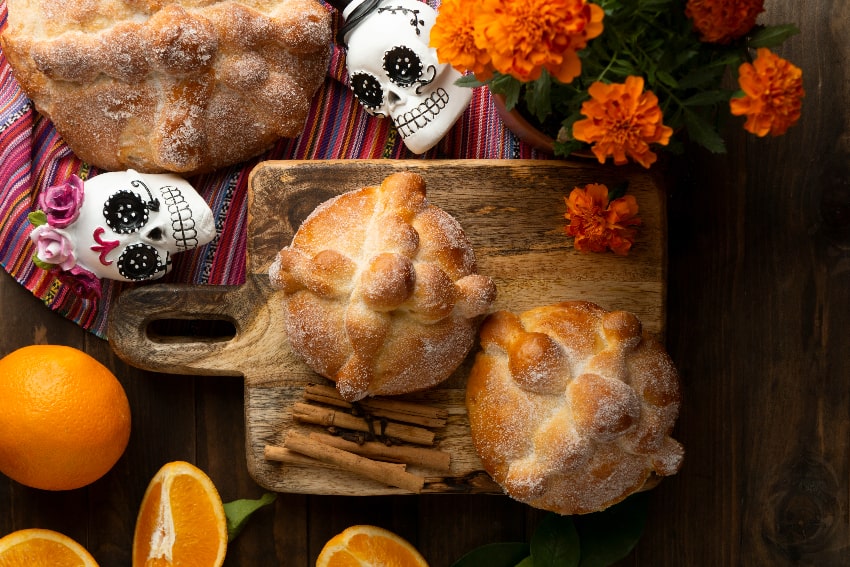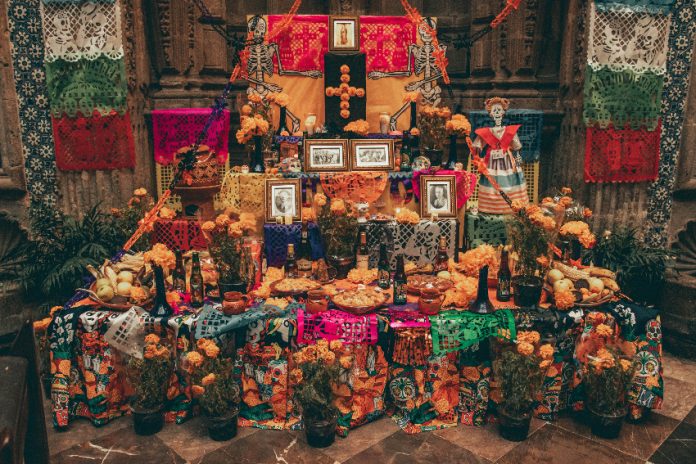Día de Muertos, or Day of the Dead, is known around the world as one of Mexico’s most colorful celebrations.
Are you one of the many who wonder why Mexicans remember their dearly departed with music, makeup and sugar skulls, instead of somber grief? Well, this holiday is about celebrating their life, and the once-a-year chance to welcome family, friends and pets home again.
Folk wisdom says that people die three times: when they take their last breath, when they are buried, and when they are forgotten. That’s why Day of the Dead is, to Mexicans, a way to keep our loved ones alive.
The offerings we put out on Day of the Dead are evidence that those of us who are still alive continue to remember and celebrate a life that was once by our side, or that we admired, and that still lives in our hearts.
It’s a time when spirits of the departed return for an earthly visit, a time when the realms of the living and the dead reunite.
One way to ensure they get the warm welcome they deserve is by crafting a heartfelt altar, known as an “ofrenda” in Mexico. You can dedicate it to a family member, a friend, a beloved pet or your favorite artist.

The altar is full of ofrendas (offerings) that symbolize love and remembrance. From photos that capture a loved one’s essence, to the aroma of their favorite dishes, to colorful flowers, altars are all about creating a portal to the past.
The roots of Día de Muertos are found in the pre-Columbian civilizations that saw death as a part of life’s eternal cycle – grieving was frowned upon, as it showed a lack of faith. In their worldview, the deceased remained integral members of the community, perpetuated in memory and spirit. The pre-Columbian religious rite for honoring the departed coincided with the maize harvest in the fall, when cherished souls embarked on their temporary return to the earthly realm.
Spanish conquistadores, upon their arrival in the 16th century, introduced their customary observances for honoring the deceased, specifically, the remembrance marked on All Saints’ Day. As they sought to convert the Indigenous peoples of the New World to Christianity, a syncretic blend evolved, ultimately giving rise to the festivity known as Día de Muertos, celebrated on the 1st and 2nd of November.
The customs and practices associated with this holiday carry profound symbolism and you, too, can find comfort in celebrating the life of your loved ones. It is believed that setting up a beautiful altar with their photos and favorite foods helps them find their way back to your heart and home during this annual holiday.
Interested in partaking in this soulful ritual?
First, make sure to include the four elements: water, wind, earth and fire.
Water in a pitcher so the spirits can quench their thirst. Wind in the form of “papel picado”, intricately perforated tissue paper that hangs above the altar; when the paper moves, it means the deceased are present. Earth is represented by food, especially the sweet bread known as “pan de muerto”, for the souls to enjoy when they visit. Fire is represented by candles to help the dead find their way from the spirit world.
This is what you need to set up an altar:
- A table and boxes: To create the three levels that represent heaven, Earth and the underworld
- Tablecloths or colorful fabric: Draped over all three levels
- Sugar skulls: To represent the sweetness of life and death
- Marigolds (cempasúchil flowers): In pots or flower vases, plus petals scattered all around
- Incense: Usually “copal”
- Papel picado: Artful perforated tissue paper that hangs above the altar
- A glass of water: The souls will be thirsty from their journey
- Salt: Helps purify the soul on its way back to the spirit world, and is usually placed in clay bowls
- Photos of the people you are honoring
- Their favorite foods and drinks, including tamales, chocolate, fruits and nuts
- Mementos: their jewelry, toys, hobbies, favorite books, hats and religious items
- Pan de muerto: The delicious sweet pastry enjoyed this time of year
- Candles: To light the way into your home
The altar can be as simple or complex as you like; there is no right or wrong way to do it. You can start setting up the altar on the 25th of October, and start lighting the candles on the 28th, since, according to tradition, this is when the souls begin to arrive. If you are hoping to receive your departed pets, they are said to arrive one day earlier, on Oct. 27.
Día de Muertos is officially celebrated on Nov. 2, and some families take the altar down up to seven days later.
The ritual of gathering and setting up these meaningful personal items and traditional elements in honor of your dearly departed and holding space for them at home is part of what makes this tradition so healing. As long as they are kept alive in your heart, they are never gone.
Sandra is a Mexican writer and translator based in San Miguel de Allende who specializes in mental health and humanitarian aid. She believes in the power of language to foster compassion and understanding across cultures. She can be reached at: sandragancz@gmail.com
